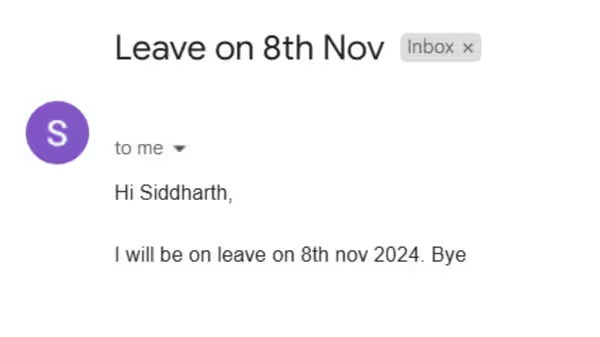Ever opened an email and thought, Wow, times have changed? That’s exactly what happened when Siddharth Shah, an investor and boss of a small team, received a simple, no-fuss leave email from a Gen Z employee. What made it special? It wasn’t your typical “Dear Sir/Madam” request. Nope. It read: “Hi Siddharth, I will be on leave on 8th November 2024. Bye.” And just like that, the conversation about modern workplace etiquette was sparked.
The Email That Started It All
When Shah shared this brief email on X (formerly known as Twitter), he probably didn’t expect it to go viral. But in today’s world, where discussions around work-life balance and employee autonomy are hotter than ever, the post resonated. More than 1.3 million views later, it’s clear this isn’t just an isolated story; it’s a sign of the times.

One user wrote, “The best part is they tell you they are on leave and don’t ask.” Another cheekily noted, “If I had sent this to my manager, he would have scheduled a meeting with HR to discuss my behavior issues.” The range of reactions showed just how divided people are about this new wave of workplace communication.
The Generational Divide: What’s Really at Play?
Why did this straightforward leave message stir so much conversation? To answer that, we need to understand Gen Z a little better. Born between 1997 and 2012, this generation is known for their directness, tech-savvy nature, and desire for transparency. They don’t see the need to pad their communication with overly formal phrases. To them, efficiency and clarity are key. Why say, “I humbly request permission to take leave,” when you can just state your plan and move on?
Some see this approach as refreshing, a long-overdue shift from the rigid, formal email culture that feels more at home in a scene from Mad Men than in a modern office. One commenter humorously pointed out, “Or you want Angrezon ke zamane wale ‘I beg to request leave on Nov 8’? Glad Gen Z doesn’t think they’re beggars.”
The Debate: Autonomy vs. Professionalism
But it wasn’t all praise and virtual high-fives. Some people worry that this direct approach crosses a line. They argue that while autonomy is important, a touch of formality maintains respect and professionalism in the workplace. One user shared a story about a colleague who declared a week-long leave during a critical project phase simply because of a breakup. It raises a question: Where do we draw the line between valuing employee well-being and maintaining workplace accountability?
So, What’s the Verdict?
Is Gen Z rewriting the rulebook for workplace communication? Absolutely. But is it for better or worse? That’s still up for debate. One thing’s clear: companies need to adapt, and that means balancing trust, transparency, and professionalism. It’s not about whether employees should ask for leave or just inform; it’s about mutual respect and understanding that every workplace culture is unique.
So, what do you think? Would you send a leave request like this, or does it push the boundaries a bit too far? One thing’s for sure—whether you’re on Team Gen Z or not, this conversation is here to stay.
Also Read this – Vivo Y300 Plus with a 32MP Selfie Camera and 44W Fast Charging – Full Review




